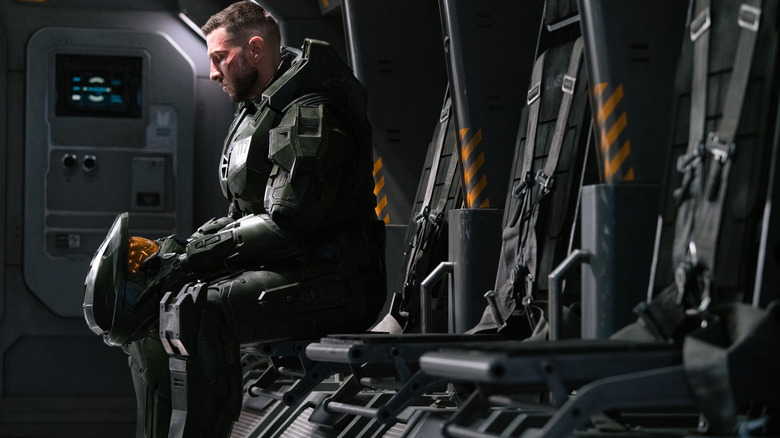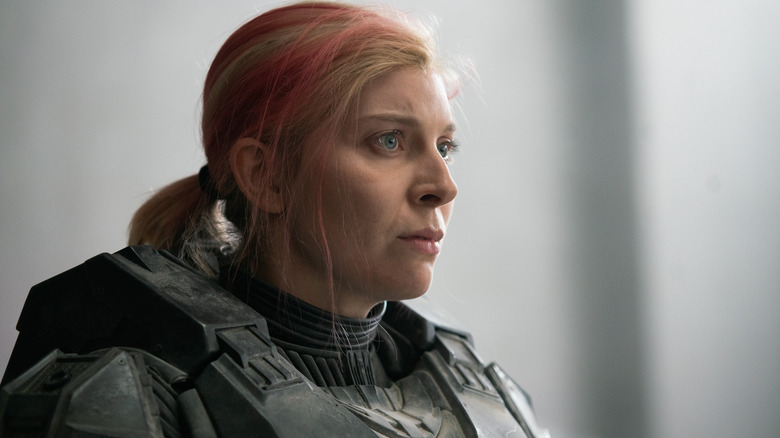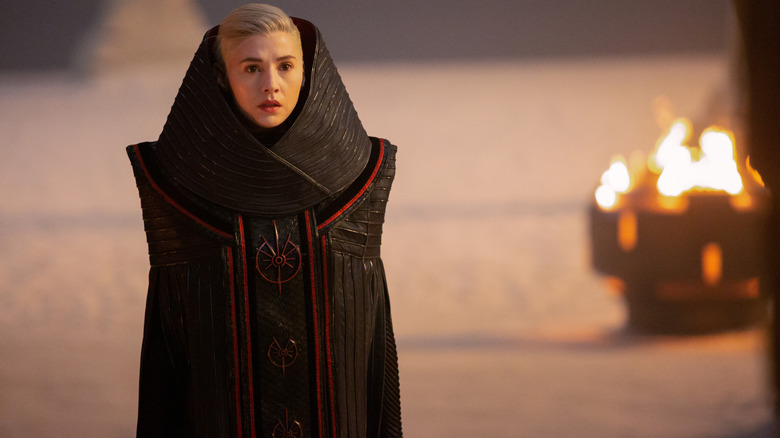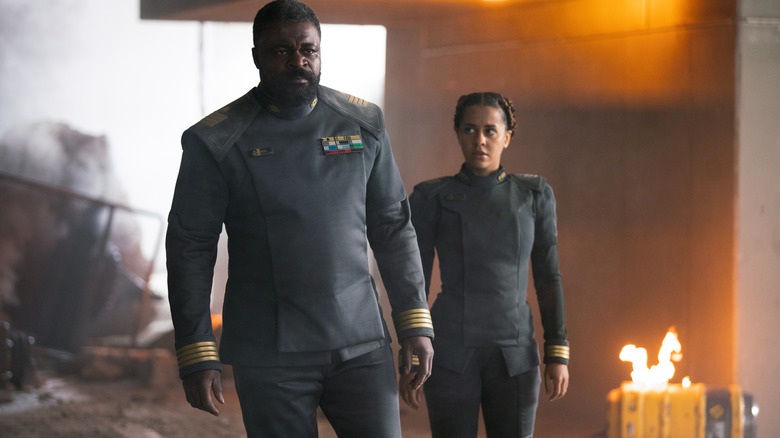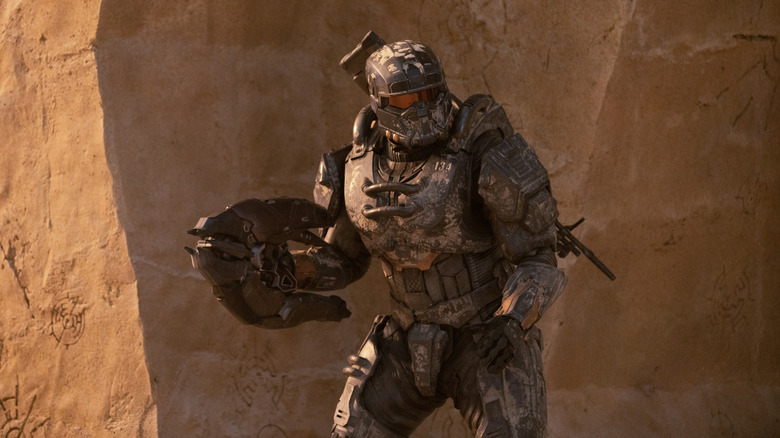Halo Episode 9: A Messy First Season Comes To A Close With A Disappointingly Conventional Finale
Maybe the real war after all had nothing to do with the UNSC and the Covenant, John and Makee, or Dr. Halsey and the Spartans' fight for their very humanity. At the end of the day, "Halo" and its continued struggle to forge its own identity wound up becoming the last, bitter taste left in our mouths as the inaugural season of the buzzy sci-fi adaptation wrapped up last night. Even worse, however, it would seem as if behind-the-scenes turmoil surrounding the production finally reared its ugly head.
Although we've covered the fact that "Halo" has experienced a rotating door of showrunners at such an early stage, I've hesitated to constantly bring up that troublesome development in these weekly reviews ... until it finally became impossible to ignore, that is. Unfortunately, we've reached that point at the worst possible moment, as episode 9 (titled "Transcendence) just couldn't escape the pervasive feeling of the series trying and failing to come to terms with what, exactly, it's trying to accomplish here in the first place.
In the past, I haven't held back from pointing out all the ways that "Halo" differs from both the source material and our expectations of what a live-action "Halo" reimagining ought to cover. And despite some early growing pains and recurring narrative issues, I'd like to think that I've been fairly consistent in praising the series for defying convention and instead throwing itself headlong into a truly unique story about mindless automatons rediscovering their humanity, the disturbing pitfalls that narcissism and arrogance in the name of "progress" can lead to, and the extreme lengths that those in power will go to in order to maintain that power and avoid all accountability — all wrapped up in the trappings of a first-person shooter about humanity fighting a bunch of extraterrestrial religious fanatics.
Directed by Jonathan Liebesman and written by Steven Kane, "Transcendence" doesn't stray from those interesting concerns entirely, to be fair. But far too much of the finale finds itself devoted to precisely the kind of straightforward, shoot-em-up action and thuddingly unsatisfying storytelling that have plagued countless video game adaptations before. It all adds up to a lackluster final chapter that may have viewers looking forward to the previously-announced second season — not for more of the same, mind you, but in the hopes of a creative course correction.
Arc of the Covenant
It all starts innocently enough, though there are a few warning signs of what's to come.
The season finale picks up in the immediate aftermath of the chaos that concluded last week's episode. Makee, hardened by seeing the worst that humanity has to offer and having fully embraced her villainy as a tool of the Covenant, has escaped with the precious Madrigal artifact in tow and guns down any Marine who stand in her way. The Master Chief, meanwhile, is left to fend off the conflicted loyalties of his Silver Team Spartan squad from behind the barrel of Riz and Vannak's guns. Under orders from Dr. Halsey to take in the Chief by any means necessary, the two super-soldiers only begin to break free of their lifelong programming once John (along with Captain Keyes) levels with them about Halsey and the UNSC's deception. With so many other things to get to, the episode doesn't devote nearly enough time to what should be an existential realization about their origins (Natasha Culzac and Bentley Kalu certainly try their best to emote through voice and body language alone), but the early moments of the episode at least bring all of our Spartans together for their long-overdue team-up.
Well, almost all of them. Unencumbered by any UNSC-issued hormonal suppressant and seething with rage, Kai sets off to track down the slippery Halsey before she can make her own escape with her assistant Adun. After boarding her ship in spectacular fashion (some dodgy VFX aside, at least), Kai corners her maker and demands answers — her real name, who she really was, and at least a semblance of remorse. Naturally, all she gets for her trouble is some blunt force trauma to the head by Adun (okay, maybe some fans have the right idea about these Spartans keeping their damn helmets on every now and then!) while Halsey flees the crashing spacecraft in an escape pod.
The earliest indication that this episode would be pulling its punches occurs when Kai somehow survives the following explosion. As tiresome as the fridging trope is, at least a Spartan's death would put even more blood on Halsey's hands and help ratchet up the stakes for a finale where truly anything could happen. Instead, the script sidesteps a potential moment of meaningful loss and sets an early tone for the disappointing developments ahead.
Setting the stage
With the obligatory table-setting dealt with, the middle portions of the episode work overtime to wrap up as many loose threads as possible.
First, John finally smooths things over with Cortana and lets her back into his head (which she's always had access to, oddly enough, making this more of an emotional impasse than anything else) with a gruff acknowledgment of, "Cortana, I'm gonna need you now." The task ahead, as it turns out, will require nothing short of an artificial superintelligence. Now bereft of both Covenant artifacts and forced to come up with some sort of plan to turn their dire circumstances around, the Chief, Miranda Keyes, Admiral Parangosky, and Cortana are left to pick up the pieces. Remembering Makee's remarks about the Covenant prophecy concerning the Halo ring and the enigmatic reference to "shards of glass," John realizes that this clue (why would an ancient Covenant prophecy bury a clue for humanity to follow? I have no idea!) points the way to the Aspero system deep in Covenant space so John and Silver Team can recover both of their lost artifacts.
Intriguingly, Parangosky very pointedly draws a distinction between "John" and "Master Chief" before sending him off on this do-or-die mission — only the emotionless super-soldier is needed on the battlefield, apparently. When the camera holds on his iconic helmet accompanied by the foreboding (but no less classic) "Halo" theme, we at least receive some reassurance that not all of the show's prior themes will be thrown out the window in favor of mindless action sequences.
After quick check-ins on Halsey (who the UNSC recaptures suspiciously quickly) and Captain Keyes (of whom John promises a "reckoning" with for his culpability in his kidnapping, and who faces equal coldness from his daughter Miranda, who was present for his admission of guilt), we finally check back in with the Covenant perspective once Makee lands on their hidden "holy planet" and reunites with her Prophet handlers. Despite reassurances that she won't be left behind on their mystical "Great Journey" upon activating Halo (one kind of "transcendence" that the episode is concerned with), it doesn't take long to discover that the Prophet of Mercy and Regret both plan to let her "burn" along with the rest of her species.
Meanwhile, Cortana takes a moment during transit to the distant Covenant system to confess her own sins to the Chief. "Dr. Halsey was going to give me full control of your body ... and your mind," she fesses up. "It was always the plan. It's what I was designed to do." For his part, John realizes that Halsey only ever needed him for his ability to use the artifact and find Halo, further driving a wedge between them. Thankfully, Cortana's change of heart allows her to appreciate John's humanity in a way Halsey never could (who, by the way, is revealed to have been a flash clone replacement while the real Halsey got away like a Bond villain). If the repeated emphasis on this subject didn't clue you in already, it readily becomes apparent that the demarcation between man and machine will somehow factor into the final act.
Halo at the cost of humanity
Once John and his Spartans make it through a gravitational gauntlet on the way to the Covenant holy planet (don't ask me why or how he did this, because the script oddly takes Cortana out of commission for this challenge and John somehow intuitively figures out a way through some sci-fi mumbo jumbo obstacles), Silver Team prepares for an orbital drop to the location for the climactic battle while Makee and the Prophets begin a ceremony to unite the 2 artifacts and "light the way" to the location of Halo.
When the battle begins during what should've been the most thrilling aspect of the finale, we're instead subjected to a final stretch that peddles in all the worst aspects of a "Halo" adaptation come to life: gooey physics, shoddy VFX work, disorienting editing, and a copious amount of pandering action sequences. Even the setting itself feels like a poorly designed video game level from "Combat Evolved," featuring only a tiny slice of land available to interact with and a sense that characters could practically run into the invisible wall if they strayed too far off the designated map. All of this comes at the cost of the show's carefully established identity to this point, trapping our protagonists in a bizarrely low-scale climax that doesn't feel nearly as momentous as it should.
Woefully outmatched and outgunned by the sudden appearance of Covenant reinforcements hidden underground, the Spartans endure every possible injury short of actual death before Makee activates the combined artifacts. Along with knocking back their enemies and revealing the (incomplete) coordinates to Halo, this promptly transports herself and the Chief back to their shared vision of Halo. Here, this metaphysical plane of existence is treated more like a moral test than a novelty, with Makee insistent on living out this fantasy together while John urges her to "let go" and send them back to reality. The choice is made for her when Kai snaps John out of this stasis and puts a bullet into Makee's chest — an abrupt and underwhelming end to a villain who certainly seemed to be primed for a much longer and more interesting arc.
But with John moments away from being overrun by the advancing Covenant and Cortana insisting that there's no way to recover the artifacts and save his team, he makes the only decision he can at the cost of his own humanity. Instructing Cortana to fully take over control of his body and mind to salvage this mission and give humanity a fighting chance, the reluctant AI does exactly that and merges man with machine ... and nothing really seems to change all that drastically? He's just as proficient in combat as before, with the only difference being that Cortana calls in air cover from their orbiting Pelican (which seems like something she could've done much earlier when they were all pinned down in the first place!).
The confusing logistics of this (otherwise thematically appropriate) development allow our heroes to retreat with the all-important artifacts while Halsey, safe and sound as she prepares to make her escape from Reach, narrates the closing soliloquy about how she means to "rewrite what it means to be human" and "achieve transcendence" — whatever these villainous, but frustratingly vague statements are supposed to mean.
It'll be up to the new showrunner, David Wiener, to figure that out for next season. Let's just hope he finds a better balance between the fascinating weirdness of what this "Halo" series wanted to be and the more traditional adaptation of "Combat Evolved" that the franchise may be obligated to deliver on.
(Re)claim to fame
- Halo Watch: Well, allow me to indulge myself with this increasingly unhinged category for one last time this year. I honestly can't believe I'm about to say this, but we reached the "Halo" season finale ... and nobody actually, physically made it to Halo. On one hand, I suppose you have to respect the outright brazenness of keeping viewers with bated breath and stringing them along with all those visions of the ringworld in recent episodes. But in actuality, I strongly suspect that much of the lead-up to the conclusion ended up completely retooled and, logistically, this decision was out of Steven Kane's hands. It doesn't make the anticlimactic ending any less so, however. I was hoping to retire this gimmick, but it looks like we'll be able to keep it going for at least part of the next season. Fun!
- The Kwan and Soren Problem: Hey, remember those 2 major characters who starred in the early parts of the season, were promptly forgotten about during the middle stretch, and then took over an entire episode right when the season was building momentum? Well, they're nowhere to be seen again and this, more than anything, proves just how much this season has felt scrambled and makeshift. I really thought Soren and Kwan (and Madrigal, which was built up to be such an important planet!) would factor into the finale somehow, but nope! In retrospect, their parting note at the end of episode 7 feels like a fitting enough place to leave them until next season. Let's hope the new creative team figures out how to make better use of Yerin Ha and Bokeem Woodbine's talents.
- Miranda Rights? To tie a bow on the rest of our supporting characters, one scene, in particular, centered on Miranda Keyes and Dr. Halsey — or, rather, her flash clone — having one last confrontation. Remember way back when Miranda so strongly objected to Kwan being sentenced to death in the premiere? Well, Halsey's punishment at the hands of a tribunal has been decided: the exact same "Article 72" execution. In a more focused and well-written storyline, Miranda's coldhearted satisfaction in her mother's death sentence would've felt like a tragic arc for an interesting character who struggled to maintain her morals within the utterly lawless UNSC. Instead, I'm not sure the full weight of this change in worldview really sinks in — especially when it turns out that Miranda was only ever conversing with a clone of her mother. Once again, please give Olive Gray better things to do next time out!
- Final Thoughts: Ultimately, I'm hard-pressed to give any real final grade for this up-and-down season. I admire so much of what "Halo" was about, if not necessarily the way it executed those ideas. Even with the change in showrunner, I hope season 2 still carries over the absolute most out-there concepts this series established. For as disappointingly conventional as this finale was, after all, it still included the franchise's peppy and lovable AI hijacking the very consciousness of our hero and puppeteering him around ... sort of like how a gamer might do in one of the games, you might say! In any case, bring on more condemnations of the UNSC propaganda machine, more unflinching examinations of the Spartans' having their childhood and humanity robbed, more of Halsey's downright Covenant-like god complex, and more of this unique version of Master Chief and Cortana's relationship. And on a personal preference note, I'd love a closer look at the Covenant hierarchy and a greater focus on the overall war so this universe doesn't feel so small and confined to the exact same handful of characters. In any case, what a fascinating little series this was, folks. I look forward to season 2.
